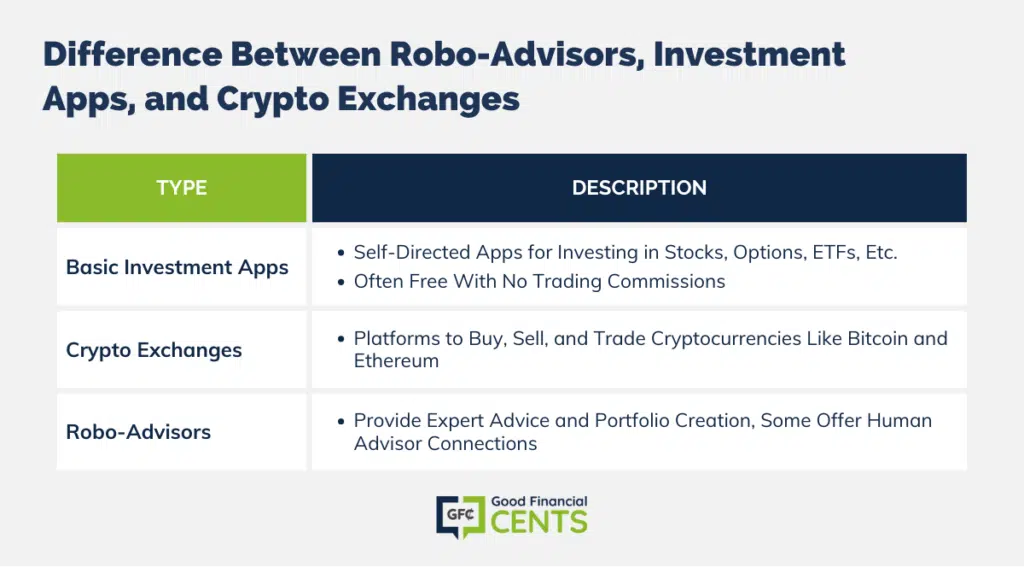When it comes to investment apps and platforms, there are hundreds of options available, with more being introduced each passing year.
This obviously begs the question: What are the best investing apps for the average person who wants to trade stocks, invest in crypto, or build long-term wealth?
Unfortunately, there is no perfect answer when it comes to the best investing apps, mostly because the answer depends on your preferences. That said, with the top investment apps compared, there are definitely some apps that stand out from the others.
To help you decide on the best investment app for your needs and goals, I compared many of the top options based on factors like functionality, investment options, and fees.
If you’re ready to invest and prefer to invest your money on the go with your Android or Apple phone, read on to learn about our top picks.
Our Picks for Best Investment Apps
- Robinhood: Best Overall
- M1 Finance: Best for No Fees
- Fundrise: Best for Real Estate
- Acorns: Best for Beginning Investors
- Cash App: Best Multi-Use App
- Betterment: Best Robo-Advisor Option
- Personal Capital: Best for Investing Tools
Best Investment Apps – Reviews
Table of Contents
Whether you’re looking for an app that lets you trade stocks and ETFs without any commissions, or you’re wondering which investment apps support Dogecoin and other cryptocurrencies, the app reviews below can help you start your research.
The top picks that made our ranking offer the best investing options with a user-friendly mobile app, as well as low or reasonable fees and minimum balance requirements.
Best Overall: Robinhood
We chose Robinhood as the best investment app overall due to the ease of getting started and the fact that investors can choose from so many different investments without any commissions. Robinhood lets investors invest seamlessly in stocks, ETFs, and more, starting at just $1.
If you’re interested, the Robinhood app also enables you to trade cryptocurrencies, which are also commission-free.
Anyone can open an account with Robinhood with a starting balance of $0, so this app is open to investors from all walks of life.
That said, this app is for self-directed investors and is not a robo-advisor. With that in mind, you won’t get any investment advice or tips from experts through the app. Also, note that there are certain securities you can’t trade on the app.
These include foreign stocks, select over-the-counter equities, preferred stocks, and securities purchased on foreign exchanges.
Also, be aware that, despite the fact that Robinhood allows commission-free trades, they specifically prohibit day trading. They even have published guidelines that could result in your account being suspended if you show day trading patterns.
Best for No Fees: M1 Finance
When you start investing with M1 Finance, you’ll quickly find that no monthly management fees or trading fees are involved. M1 Finance also makes it easy to create mini portfolios, which are referred to as pies.
Each pie contains a mix of ETFs and stocks that are consistent with the particular investment theme of the given pie. M1 Finance offers more than 60 pie templates based on certain investment themes.
In that sense, M1 Finance is a hybrid between a robo-advisor and self-directed investing.
They completely manage your portfolio for you in the style of a robo-advisor. However, it’s you who determines the specific investments that will be held in your portfolio.
This will give you the ability to pick specific investments based on your goals without having to concern yourself with managing the portfolio.
There is no minimum account balance requirement for M1 Finance, but you do need at least $100 to begin investing. And since they allow the purchase of fractional shares, you can create a fully diversified portfolio even with a relatively small amount of money.
The app is available for taxable accounts as well as the best retirement accounts. You can find out more in our full M1 Finance Review.
| I’ve been investing with Fundrise since 2018. Disclosure: when you sign up with my link, I earn a commission. All opinions are my own. |
Best for Real Estate: Fundrise
Fundrise is a user-friendly technology company that lets you invest in commercial real estate through its investment platform and app.
One of the big advantages of Fundrise is that you don’t need to be an accredited investor (high income and/or high net worth, which is required on most commercial real estate apps) to participate in the app. It’s open even to small investors.
Commercial real estate has traditionally been one of the best investments available. It includes investing in office buildings, retail space, and apartment buildings.
According to Fundrise, investors through their platform received an average return of 7.31% in 2020, 22.99% in 2021, and 1.5% in 2022. You can check out personal Fundrise returns here.
Further, Fundrise screens (“vets”) the deals, and you choose the ones you want to invest in. The minimum investment is between $10 and $5,000, depending on the level of investing you want to make immediately.
There is an annual fee of approximately 1% taken from your investment, and once you invest in a deal, you must stay in it until it pays out. You can learn more about this app and how it works in our Fundrise review.
Best for Beginning Investors: Acorns
As we conducted our investment app comparison, we quickly learned that Acorns is one of the best options for beginners. We say this because Acorns uses the concept of “spare change” to help you build up your investments, and they do it all automatically on your behalf.
In essence, this smartphone app basically rounds up all of your purchases and then makes an investment on your behalf every time you spend, in a strategy also called micro-investing.
Ideally, you won’t notice your purchase amounts being rounded up, and your investment balances will grow over time with no major work on your part.
For example, if you make a payment of $7.25 at a fast-food restaurant, the app will automatically charge your account $8. It pays the restaurant, then allocates 75 cents for savings. Once the savings allocation reaches $5, it’s moved into your Acorns investment account.
The Acorns Investment Account is also a robo-advisor that will create your portfolio and manage it for you. You can use the app to invest in ETF trades, and expert portfolios are even available to choose from.
Acorns even lets you round up your purchases to invest in a Bitcoin ETF in order to further diversify your portfolio.
Acorns also rolled out an IRA option called Acorns Later, so you can have both regular and retirement investing on the same app. There’s no minimum initial investment, and the fee for investing starts at just $1 per month.
Take a look at our Acorns Review for more details on how you can invest your spare change while building wealth for the long term.
Best Multi-Use App: Cash App
We chose Cash App as the best multi-use investing app due to the many features it offers in addition to its investment options. For example, you can use the Cash App to make purchases with a customized debit card, and you can also use it to send money instantly to friends.
Cash App also lets investors buy fractional shares of stocks or ETFs starting at just $1, and crypto investing options are available as well.
You can also receive your paycheck through the Cash App as early as two days earlier than normal. ATM withdrawals are free with Cash App as long as you have at least $300 added to your account each month.
Cash App also lets users invest regularly with automated buys. You can also set up notifications so you know immediately when bitcoin or the stocks you’re ready to buy hit your target price.
Best Robo-Advisor Option: Betterment
Betterment is the largest and most popular independent robo-advisor, and they’re geared toward investors of all levels. This company is also a fiduciary, which is rare among investing apps and means they are legally required to act in your best interests.
When you sign up with Betterment, you’ll be asked an array of questions that will help determine your tolerance for risk and your overall investment timeline. From there, a portfolio of stock and bond ETFs is created and managed by the platform.
Betterment also offers automated investing, as well as IRAs and a 401(k) option. You will even be able to use the Betterment app to invest in crypto in the future through a program called Makara by Betterment.
Betterment will periodically rebalance your portfolio to maintain the desired asset allocations. They will also automatically reinvest dividends. You can also use this platform to maintain either a taxable account or a retirement account.
You can even choose to have a socially responsible investment portfolio or take advantage of some more sophisticated investment portfolios.
If you’re ready to begin investing but lack either the time, the expertise, or the motivation, Betterment is the trading platform for you. Here’s our list of other trading platforms to consider.
You can turn your money over to the app, have it professionally managed, and free up the rest of your time to do whatever it is you want to do with your life. Read more in our Betterment review.
Best for Investing Tools: Personal Capital
Personal Capital has long been one of the most popular investing apps, and it’s easy to see why. This app offers both a premium wealth management service and free financial software that can benefit just about anybody, whether you’re an active trader or a beginner.
With that in mind, you can use the app’s robust robo-advisor features, or you can use it to manage your finances in other ways.
The Wealth Management side is the premium service. If you choose this plan, Personal Capital will directly manage your portfolio, similar to a robo-advisor.
However, they will provide more financial advice than you’ll typically get from robo-advisors.
The fee for the service is 0.89% per year for most investors (with under $1 million under management). However, the fee declines to 0.49% for larger portfolios.
The free financial software has budgeting capabilities, but its investment features may be what separates it from regular budgeting software.
Some of the investment services they provide include:
- 401(k) Fee Analyzer: If you have a 401(k) plan, you’ll love this tool. It analyzes your plan to let you know exactly what you’re paying in fees. It then recommends alternative investments within your plan that charge lower fees. This can be a game-changer over the long term.
- Retirement Planner: This tool will help you determine if your retirement savings are on track to enable you to retire. It can help you run various what-if scenarios based on spending goals and expected future income. That will give you a chance to make adjustments going forward.
- Investment Checkup: Once your risk profile has been determined, the tool will determine if your asset allocation is consistent with that profile. It will then recommend an allocation that will work for you.
- Asset Allocation Target: If you’re underweight in any asset categories, the tool will recommend making improvements to move your portfolio to where it needs to be.
You can read about all of the platform’s features in our Personal Capital review.
NOTE:
Investment App Guide

As you search through our investment app comparison, you’ve probably come up with a few questions you need answers to. We’ll go over some of the most common questions about investment apps in the sections below.
How to Start Investing
If you’re eager to start investing for the first time, investment apps offer one of the easiest and fastest ways to do so. Most of the apps in our guide let you open an account and get started with as little as $0, and many let you invest in fractional shares starting at just $1 to boot.
If you’re a beginning investor who is learning the ropes of personal finance, you can start your journey by learning as much about investing as you can.
For example, you should take the time to learn about stocks, bonds, ETFs, options trading, and index funds, as well as the difference between investing in a brokerage account or through a retirement account like traditional IRAs or the best Roth IRAs.
Also, take the time to learn as much as you can about crypto investing, which is made easy through various investment apps.
If you want to start investing but know you need some help figuring out your first steps, we suggest investing with apps for beginners, such as Acorns or M1 Finance. Both let you invest in expertly curated portfolios, and you can get started with little more than your pocket change.
Starting small may be the best idea to begin with, especially if you’re paying off debt from multiple credit cards or loans.
The Difference Between Robo-Advisors, Investment Apps, and Crypto Exchanges
As you look over the brokerages and exchanges that offer investment apps, you may be wondering what makes each one different. For example, what is a robo-advisor exactly? And how do crypto exchanges work?
Here’s a general overview of each type of investment app you’ll want to consider:
- Basic Investment Apps: Investing apps make it possible to invest in stocks, options, exchange-traded funds (ETFs), and more using your mobile device. However, most investing apps are self-directed, meaning you won’t get any professional wealth management advice.
Many investment apps are free to use with no commissions for trades, but you should always check to make sure. Some offer more than one account type.
- Crypto Exchanges: Crypto exchanges are platforms that let users buy, sell, and trade crypto assets such as bitcoin, ethereum, dogecoin, and more.
Some of these exchanges also let you earn interest on your crypto deposits or use your crypto as collateral for a loan. With this being said, it’s also worth noting that some basic investment apps let you invest in crypto as well.
- Robo-Advisors: Think of robo-advisors as digital financial advisors. These investment apps charge annual management fees, but you’ll get expert financial advice and help as you create your portfolio.
While some robo-advisors focus more on using technology to help you plan your investments, others, like Personal Capital, connect you with a human financial advisor as well.

How Do Investment Apps Work?
Investment apps work similarly to online brokerage accounts in that they let you buy, sell, and trade financial products based on your goals.
The best investing apps just make the process easier and mobile-friendly since you can execute most transactions using your smartphone or another favorite mobile device directly from your bank account to your investing account.
Many investing apps also offer features like notifications and banking functionality. For example, some investment apps let you send money to friends or connect your investing account with a checking or savings account.
Also note that some investment apps with free stock exist, although you typically have to invest a minimum amount upfront to qualify.
How to Find the Right Investment App
To find the best investing app for your needs, you need to think about what you hope to accomplish, the types of assets you want to invest in, and whether you are willing to pay for professional services.
Answering these questions will determine which type of investing app or service is best for you, whether that’s an investing app that lets you trade stocks and ETFs on your own or a robo-advisor that guides you through the process.
Other factors to consider include management fees or commissions, minimum account balance requirements, app ratings, and internet safety and security.
Also take into account whether your app will let you track stock market performance in real-time (especially if you’re more into active investing) and whether it has any educational resources for financial planning.
By considering all these factors and how they might apply to your situation, you can find the best app for your investment strategy and ultimate financial goals.
How to Learn More About Investing
If you want to learn more about investing, you should start by reading everything you can. For example, take the time to learn about the best online brokerage accounts and what they offer, as well as the best crypto exchanges and how they work.
Other resources that can help you learn about investing include the following:
- How to Invest $10K
- How to Invest in Bitcoin
- Best Online Stock Brokers
- Best Short-Term Investments for Your Money
- Best Long-Term Investments
While you’re in the thick of finishing your research, take the time to learn about the difference between ETFs and mutual funds. Our guide for beginner investors is a good place to start your journey.
How We Found the Best Investment Apps for 2024
To find the best investing apps for 2024, we looked at a variety of factors, including investment options and features. We also looked at the fees involved in investing, whether that includes commissions for individual trades or annual account management fees.
Ultimately, we looked for investing apps with low minimum balance requirements (or no requirements) as well as no fees or low fees. We also looked for apps that let users access as many investments as possible, including stocks, ETFs, options, expertly curated portfolios, crypto, and more.
Summary of the Best Investment Apps for 2024
- Robinhood: Best Overall
- M1 Finance: Best for No Fees
- Fundrise: Best for Real Estate
- Acorns: Best for Beginning Investors
- Cash App: Best Multi-Use App
- Betterment: Best Robo-Advisor Option
- Personal Capital: Best for Investing Tools





Leave a Reply